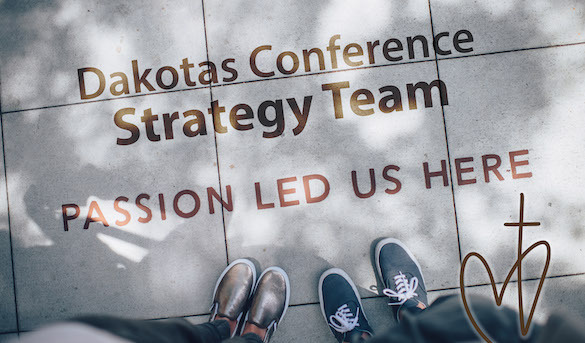
Strategy Team discusses network for sharing

In early January, several individuals from the Dakotas Strategy Team, the Future UMC Task Force, and individuals connected with the potential Global Methodist denomination met virtually at a “Dakotas Strategy Team Roundtable” to discuss some of the possibilities of Methodist connection and ministry if, as some suggest, there is a separation in the United Methodist Church in the near future.
Rev. Peggy Hansen, of the Strategy Team’s communications group, said, “We wanted to have the conversation as a Strategy Team before the 2022 Annual Conference to see the possibilities. Survey results from last year’s Annual Conference, along with Resolution 1.3 (passed at Annual Conference 2021) gave us some guidance on what sharing our assets and resources might look like.”
A key motivation for this conversation is good stewardship of limited resources. There was acknowledgement that the continuing Dakotas UMC, as well as any newly formed denominations, would need similar administrative services to support churches and pastors. Both groups having to support similar infrastructure would not necessarily be advantageous or necessary. In an economic era when businesses try to optimize their administrative costs, and utilize financial and personnel resources to the fullest potential, the conveners saw how future church groups can also benefit from cooperation and sharing of ministry resources.
Strategy Team member Al Roll, the Dakotas Conference Missional Impact Development Coach, said the group “wanted to see if we could talk about sharing.” He was joined in the meeting by Rev. Brandon Vetter, Rev. Kris Mutzenberger, Rev. Thom Bowsher, Rev. Roger Spahr, Rev. Ross Reinhiller, Rev. Ray Baker, Allison Galbreath, Rev. Teresa Whetsel, Jeff Pospisil, and Keith Shew. Roll felt the meeting was positive and fruitful for all.

“We felt it was important to begin discussing options and ideas, since there may be only one Annual Conference session prior to the next General Conference. If we could reach some understandings prior to General Conference, then we would all benefit from the discussion, sharing, and drafting of potential plans in advance.”
The central idea from this virtual gathering was that there are many resources that the future Dakotas Conference and newly forming denominations value greatly and would like to utilize in their ministries.
Roll said, “It was a great discussion, a respectful discussion. We realized there are many benefits to sharing that some of us may not have understood.
One of the next steps resulting from this meeting is that several individuals will be working togetehr to draft a framework for the roundtable to review at their next meeting in the coming weeks.
The Dakotas Methodist Network is a potential name for this framework. The network would mainly suggest how business and administrative services, finance, camping and communications might be leveraged and shared by each of the possible groups. Services that are theologically distinct would naturally be less universally sharable. The Dakotas and Minnesota Foundations have aligned themselves to serve churches, individuals, and affiliated organizations with a Wesleyan heritage. The Dakotas Board of Pensions is studying options for serving multiple groups or denominations that might result.

“What was so positive,” Roll said, “was that we all felt that, where we could share services and resources, why wouldn’t we?”
For additional details about the work of the Dakotas Conference Strategy Team, please see their extensive resources on our website here.